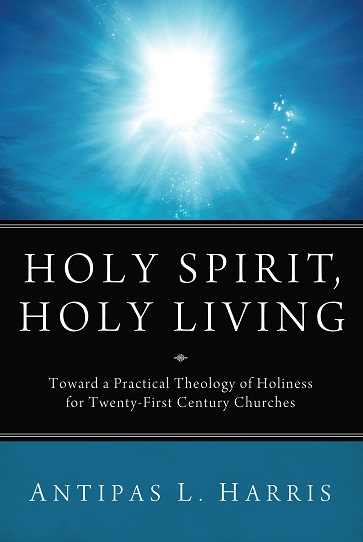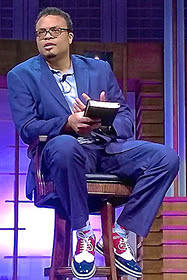Antipas Harris: Holy Spirit, Holy Living
 Antipas L. Harris, Holy Spirit, Holy Living: Toward a Practical Theology of Holiness for Twenty-First Century Churches (Eugene: Wipf & Stock Publishers, 2013), 181 pages, ISBN 9781610979306.
Antipas L. Harris, Holy Spirit, Holy Living: Toward a Practical Theology of Holiness for Twenty-First Century Churches (Eugene: Wipf & Stock Publishers, 2013), 181 pages, ISBN 9781610979306.
In Antipas Harris’ book, Holy Spirit, Holy Living: Toward a Practical Theology of Holiness for Twenty-First Century Churches, the author aims to broach the topic of holiness by writing an academically informed work that is accessible and beneficial to the everyday Christian (xv). Although this work is academic in nature, non-academic readers will be able to enjoy the author’s work due to the book’s readability. The book is divided into two parts each containing four chapters. Part one explores and addresses the meaning of and need for biblical holiness, and the part two is largely a proposal on how to walk out holiness from day-to-day. This book is located within a Wesleyan Pentecostal perspective on holiness, although it refreshingly explores both the strengths and weaknesses of the overall tradition.
Chapter one lays a foundation for the whole of the book by showing the need for a practical theology of holiness for the twenty first century. The author does this by showing how this call to a holy life lies within the pages of scripture and touches on the fact that there is a middle way between lawlessness and legalism. Chapter two further develops this middle ground by giving further definition to how to live “in the world but not [be] of the world”. According to Harris, holiness at its core is forsaking the world and identifying with Christ (p. 25), yet responding to the call to be missional in the world (p. 33). In this chapter, it becomes more apparent that for Harris, holiness is a lifestyle and a “distinctive way of living in the world” (p. 37).
Chapter three serves as an overview of the scriptural content that speaks to the issue of holiness and sanctification specifically. Here the author looks at various elements that speak to holiness in the Old Testament including the Torah (pp. 43-44), the Sabbath (pp. 45-48), the Old Testament Holiness code (pp. 48-50), and the Psalms (pp. 52-55). Then he shifts to cover the New Testament by looking at what Paul (pp. 57-58) and Peter (pp. 58-59) had to say about it. Although the author clearly desires a balance between heart and action, it is worth noting that this concise yet thorough treatment of the scriptural content on holiness focuses more on the OT view of holiness than the NT, which lends itself to being more performance based. Nonetheless, it is evident the author attempts to strike the difficult balance between an inward heart condition and an outward lifestyle. Chapter Four touches on the connectedness yet dissimilarities between salvation and sanctification (pp. 62-67), and then the rest of the chapter focuses on how to live out that sanctification. Harris makes an important distinction, though, by connecting living the “sanctified life” through the Holy Spirit’s empowerment (pp. 85-86).
Part II begins in chapter five where the author gives his “four Ds” on how to live out the holy life: “devoted life of prayer, a disciplined lifestyle with determination to live God’s ways despite the odds, and commitment to developing a life of service to and on behalf of others” (p. 92). This chapter is filled with good, practical advice on how to begin to put holiness to practice. Further, chapter seven gives “Four Cs” (confusion about the definition of holiness, culture might get in the way, church might get in the way, cravings [lust] get in the way) that serve as hindrances to holiness and chapter eight gives “Four Rs” (repentance, recommitment, recovery, and renewal). Chapter seven gives a helpful picture of common hindrances many have to living out holiness and chapter eight serves as a strong appeal to the church on her situation of “urgency in society” (p. 134). Harris’ conclusions in chapter eight might cause debate among readers as whole, but is nothing new in light of the controversy surrounding the relationship between the church and greater society (particularly in the political arena). All in all, I commend the author for discussing how this issue speaks to the issue of holiness.
The closer we get to God, the more holy we become.
- Antipas Harris
Reviewed by Andrew Ray Williams
Publisher’s page: http://wipfandstock.com/holy-spirit-holy-living.html
Category: Living the Faith, Summer 2015



